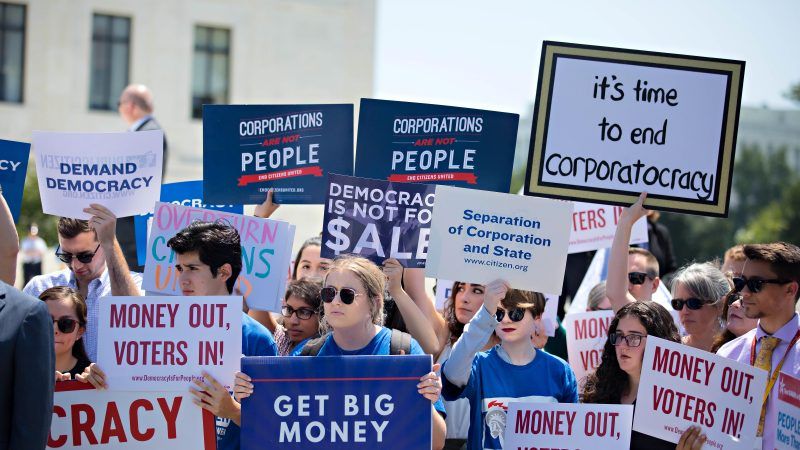Senate Democrats Back Constitutional Amendment to Undo Citizens United
Plus: Marijuana banking, suing Facebook, and more...

Democrats are trying to amend the constitution to undo a Supreme Court decision. The ruling they take issue with is 2010's Citizens United v. FEC, which lets corporations engage in political speech without facing extreme regulation.
Last week, the entire Senate Democratic Caucus introduced a constitutional amendment to undo Citizens United. In 2014 "we reported this amendment to the floor," said Sen. Dick Durbin (D–Ill.) during a July 30 press conference. "What happened to it? A McConnell filibuster happened to it….With a new leader by the name of Schumer in the Senate, we can be sure that it won't be a filibuster stopping us."
Yesterday, one of those senators put the spotlight on the crusade. "Citizens United has damaged our democracy and allowed corporate money to flood our politics," claimed the California senator and presidential candidate Kamala Harris on Twitter. (Harris herself has received lots of corporate cash, though she's recently been going back and forth on whether she'll keep taking it.) "We can't allow this to continue—which is why my colleagues and I introduced a constitutional amendment to overturn this terrible Supreme Court decision," she added.
Harris and company are continuing Hillary Clinton's crusade. Back in 2016, Clinton suggested "that the real problem with that decision is that it did not permit the legal barring of a documentary critical of her," as Reason's Brian Doherty wrote. Clinton complained the critical film should have been banned around election time (under a 2002 law disallowing corporations and labor unions from making "electioneering communication" in the days or months leading up to an election) "because the legal entity behind it was organized as a corporation."
That gets to a crucial point about "corporations": They're not all massive behemoths or big money spenders. Small and sometimes single-person businesses, nonprofit groups, activist organizations, trade associations, labor unions, and all sorts of entities that liberals like are organized as corporations, and as such benefit from the right to be public about political matters without powerful elites shutting them down.
Democrats pretend that ending Citizens United is about restoring transparency and fairness to political speech. But what sort of transparency and fairness prohibits vast swaths of its organized advocacy and community groups from talking about candidates and campaign issues at the very time when they're most important? Behind the rhetoric about "dark money" and "corporate influence," what this "reform" would do is to strip speech rights from all sorts of citizens—and let politicians hoard power over political narratives themselves. (See also: "Our Presidential Cycle Shows Why Citizens United Was Decided Rightly" and "The Citizens United Backlash Threatens Basic Rights.")
FREE MINDS
BREAKING: Today a court ruled that Facebook users in Illinois can sue over the company's use of face recognition technology without user consent. This decision is a major win for privacy rights, and recognizes the dangers posed by the increased use of face recognition technology.
— ACLU (@ACLU) August 8, 2019
FREE MARKETS
Marijuana-business banking bill hits a snag. Sen. Mike Crapo (R–Idaho), who heads up the Senate's banking committee, says he's down with overhauling certain rules so that marijuana businesses can bank. But Crapo rejects the existing bill being supported by a bipartisan, bi-chamber congressional crew. The Secure and Fair Enforcement Act is "being cosponsored by nearly a third of the body," reports Marijuana Moment. However, "Crapo floated the idea that his chamber might instead pursue separate legislation or even seek an administrative fix for the issue rather than pass a bill."
QUICK HITS
- Socialist Rep. Alexandria Ocasio-Cortez (D–N.Y.) says she has "a lot of common ground with many libertarian viewpoints."
- The latest scapegoat for mass shootings is reefer madness:
https://twitter.com/mirandadevine/status/1159559380108554245
- While claiming it doesn't investigate ideologies, only actions, the FBI targeted what it calls "black identity extremists" with a program called IRON FIST:
FBI docs leaked to me reveal that in 2018, the Bureau targeted "Black Identity Extremists" under a program codenamed "IRON FIST", planning to use undercover agents to infiltrate the group which it considered a top counterterrorism priority.
For @tyt: https://t.co/q9hI2zQLQn pic.twitter.com/KRaLyUGxzX
— Ken Klippenstein (@kenklippenstein) August 8, 2019
- The "intellectual dark web" publication Quillette has retracted an anti–Democratic Socialists of America piece allegedly written by an alienated blue-collar member of the group. The piece was a hoax and the purported author did not exist.
- The founder of the neo-Nazi website The Daily Stormer has been ordered by a federal judge to pay $14 million in damages in a harassment lawsuit.
- ICE agents tried to raid a Brooklyn homeless shelter without a warrant.
- Checking in on Ferguson:
Five years after #Ferguson, here's my look at DOJ's police reform efforts. A huge chunk of the Civil Rights Division's police practice group is gone, and the Trump administration shrunk the size of the unit. https://t.co/M7I69ZDcpe
— Ryan J. Reilly (@ryanjreilly) August 9, 2019
- 2020 presidential candidate Elizabeth Warren said yes when asked if she thought President Donald Trump is a white supremacist. "He has given aid and comfort to white supremacists. He's done the wink and a nod," said Warren. "He has talked about white supremacists as fine people. He's done everything he can to stir up racial conflict and hatred in this country."
- Minneapolis might ban drive-through restaurants.
This is the most perfect response to surveillance tech that has ever existed. https://t.co/tu3rNIlKXQ
— Nishita Jha (@NishSwish) August 9, 2019


Show Comments (169)